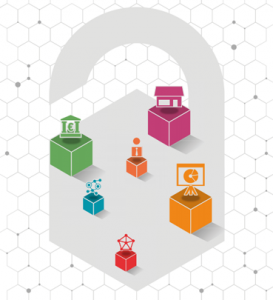
It is in this context that commentators are discussing blockchain’s potential for the consumer goods sector in supply networks. There are arguments that it could help tackle food fraud, boost trust in business transactions and accelerate operational processes. Of course, it is just one technology available to business leaders as they look to address efficiency, sustainability and general supply chain issues.
Traditional supply chain methods, reliant even today to some extent on paper contracts, emails and text files, are a burden on food and drink businesses; they are more prone to error, can slow down administrative, and transactional processes, and mean that supply network problems can be difficult to trace. If run on a shared ledger system, where every transaction is visible to all authorised stakeholders and cannot be manipulated retrospectively, the technology may offer added trust to transactions between businesses, making them more accessible and easier to monitor.
Overall, the added immutability of a distributed ledger means that inter-enterprise processes become easier to trust in case of dispute, allowing FMCG giants to enhance management of suppliers and ensuring conformity to operational and regulatory standards.
Embracing this kind of interoperable database and shared messaging system could also provide a solution to food fraud, which can lead to consumers being misled about product quality. Supply chains are extremely complex and it can be difficult for companies to identify where exactly fraudulent practices have occurred and stamp them out where counterfeiting remains a huge problem. The enhanced immutability of the data and trust a distributed ledger provides means corporate leaders may be able to pinpoint discrepancies in supply networks identifying “copies” easier.
It is not just a question of food quality – it is also about building trust with consumers. After a series of scandals relating to food standards, the concept of the “CEO statesman” is becoming more prominent; especially the idea that companies need to carefully consider their impact on communities in order to appeal to socially conscious millennials.
It is important to remember, however, that blockchain does not provide a complete solution to the challenges facing the food sector. For instance, while much is made of the ability to store data in an unbreakable chain, the technology itself doesn’t actually protect against fraudulent data being used in the first place. These systems only secure data against retrospective manipulation.
What should also be considered is that this way of storing and distributing data rarely offers itself as an “all-in-one” bargain package: companies need to review the ROI compared to existing systems in place and even newer technologies. Instead, it’s most likely to provide value when used in a targeted way for a specific service or product categories. A possible scenario would be to incorporate blockchain systems as part of a value network, with other technologies being deployed elsewhere.
Consumer goods businesses need to ensure that they understand the ways to make the most from immutable and shared data bases and implement them in the right way. FMCG leaders should ensure they are staying in touch with the latest developments in digital consensus making tech like blockchain and demonstrate an enthusiastic, open attitude towards industry collaboration and shared learning initiatives.
In this context, The Consumer Goods Forum together with experts from IBM are organising a series of workshops starting in March 2018 that will allow industry to discuss aspects of consensus driven processes and immutable databases in a collaborative and pre-competitive way. For more information on the workshops, please contact us.
Ruediger Hagedorn
Director, End-to-End Value Chain
The Consumer Goods Forum

